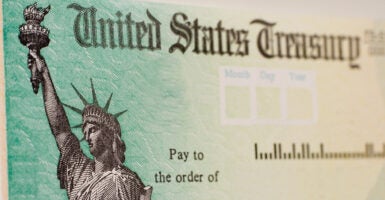As many Americans shopped for Black Friday deals, the Biden-Harris administration released annual data on improper payments showing that the federal government spent at least $161 billion of taxpayers’ money sending payments to the wrong people and in the wrong amounts in fiscal year 2024.
Although this amount marked a decrease from the pandemic-era average of $238 billion per year in improper payments between 2020 and 2023, $161 billion is still an egregious amount. It’s almost twice as much as the $89 billion budget of the Department of Homeland Security. And the total reported covers only the programs tracked and the improper payments discovered.
Such massive errors would never happen in a private business or within a family budget. But when the federal government empowers bureaucrats to spend other people’s money without consequence or accountability and provides an ostensibly limitless source of funds through its tax-and-borrowing powers, enormous and generally rising improper payments are not a surprise.
Here are five facts found in the data for fiscal 2024, which ended Sept. 30:
- The federal government sent $161 billion in improper and unknown payments. This equals over $1,200 for every household in America.
- Over the past five years, the government spent $1.1 trillion in taxpayer dollars on improper payments. That’s $8,300 for every household in America.
- Almost all improper payments are overpayments. In 2024, only $7.8 billion of the total $161 billion in improper and unknown payments was in underpayments.
- Once out the door, improper payments are difficult to recover. Over the past five years, only 10% of improper payments was recovered. Such recovery is expensive.
- Despite legislation designed to impose accountability and integrity, no real consequences exist for improper payments. Rather, agencies often are rewarded with larger budgets to cover their errors.
And here are five examples of “worst offenders” from fiscal 2024:
- Federal health care programs top the charts for improper payments. Medicare, Medicaid, and the Children’s Health Insurance Program accounted for more than half of all improper payments in fiscal 2024. The three programs’ combined $87 billion in improper payments equals the cost of health insurance premiums for 9.7 million individuals or 3.4 million families.
- The Treasury Department has the worst improper payments rate. Of four tax-credit programs that track improper payments, three have improper payments above 27%. In total, wrong payments amounted to $21 billion, or more than 1 in 5 dollars distributed by the Treasury Department through the earned income tax credit, additional child tax credit, American opportunity tax credit, and refundable Obamacare tax credit.
- Pandemic-related programs were awash with fraud and abuse. Even after most improper payments in these programs were accounted for in prior years (including at least $191 billion in unemployment benefits), the Restaurant Revitalization Program issued $8.7 billion, or 30% of all payments, improperly in fiscal 2024. In addition, 25% of remaining Paycheck Protection Program payments were improper.
- Improper payments from the Department of Veterans Affairs are particularly indefensible. Payments such as veterans’ pensions should be highly accurate because eligibility is based on decades of service and Veterans Affairs has extensive data on veterans. Yet, the VA pension system had an improper payment rate of 14% in fiscal 2024. Moreover, although most agencies assert that the bulk of improper payments are outside of their control, the VA admitted that 100% of its reported $600 million in overpayments was within the agency’s control.
- Welfare programs are plagued by large improper payments. The Supplemental Nutrition Assistance Program, known as SNAP or food stamps, had an improper payment rate of 11.7%, issuing $10.5 billion in improper payments. The Supplemental Security Income program had an improper payment rate of 10.6%, with $10.6 billion in improper payments. SNAP and SSI are mandatory programs, so they receive whatever funding is needed to pay benefits, regardless of whether the payments are accurate. But when discretionary programs such as Head Start have an improper payment rate of 12%, that prevents wait-listed low-income families and children from participating.
President-elect Donald Trump’s proposed Department of Government Efficiency, led by entrepreneurs Vivek Ramaswamy and Elon Musk, hopefully will improve accountability and integrity in the federal government’s $3.8 trillion in annual payments.
A permanent Taxpayer Integrity Office or a fraud czar also could play a role going forward.
But since rising improper payments are only a symptom of the disease of excessive growth in government spending, reducing such payments also will require right-sizing the role of government.































